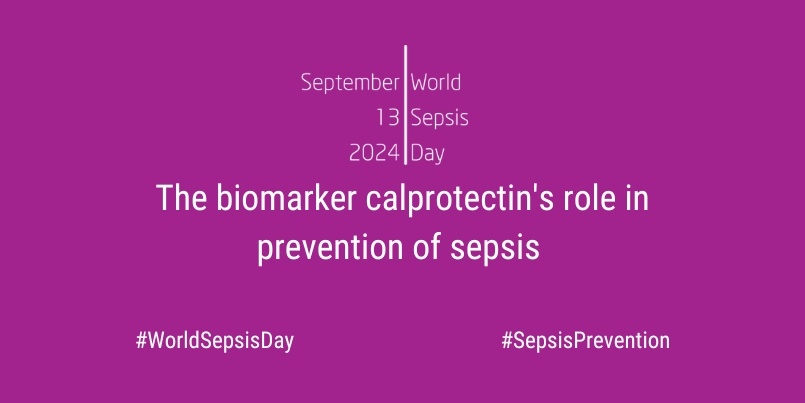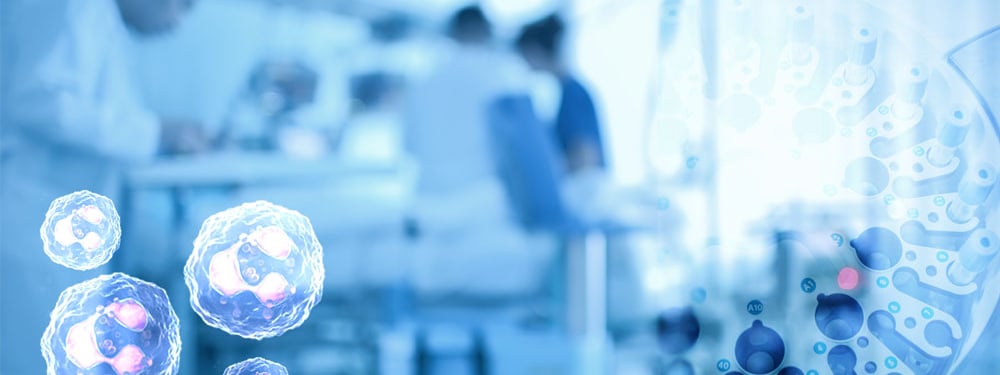
Plasma and serum calprotectin in the assessment of infection
The biomarker calprotectin is a heterodimer of two calcium-binding proteins (S100A8/A9 or MRP8/14) and belongs to the S100 protein family. Upon bacterial infection and inflammation, activated neutrophils release calprotectin, which serves as an alarmin and exerts anti-microbial and pro-inflammatory functions.1-4
The biomarker has through several studies shown to be very valuable in the emergency department (ED) and the intensive care unit (ICU) in the detection and assessment of infections.
Circulating calprotectin in sepsis
Calprotectin has shown to be able to distinguish between viral and bacterial infection,5-7 which can aid in decision making of the course of treatment and antibiotic use. The biomarker can also predict bacterial infections even before the appearance of clinical symptoms, as it levels increase within only a few hours.8, 9
Early detection and intervention are critical in preventing the development of sepsis and severe outcomes. Elevated calprotectin levels can be a useful tool to predict severe events, clinical course, and mortality in septic patients10-13 and improve classical risk scoring.14 Early detection and risk stratification at the emergency department helps identifying patients at risk for deterioration, and guide decisions on course of treatment and necessary transfer of patients to the ICU.15 This makes calprotectin an early and sensitive biomarker, and an ideal candidate for assessment of risk for severe infections and sepsis.

Calprotectin related to infections and sepsis in the ED and ICU
The value of plasma and serum calprotectin has been investigated in several studies performed in EDs and ICUs in different hospitals across Europe, focusing on the biomarker's role in diagnosis and assessment of disease severity, as well as in prediction of clinical deterioration.
Several studies with Gentian’s plasma and serum calprotectin test GCAL®*, which is intended as an aid in detection and assessment of inflammation and inflammatory response to infections, have been published with focus on bacterial infections and sepsis.
Studies investigating plasma and serum calprotectin:
Plasma calprotectin as an indicator of need of transfer to intensive care in patients with suspected sepsis at the emergency department.
Parke Å et al. BMC Emerg Med. 2023
Analysis of Calprotectin as an Early Marker of Infections Is Economically Advantageous in Intensive Care-Treated Patients.
Havelka A et al. Biomedicines. 2023
Calprotectin is superior to procalcitonin as a sepsis marker and predictor of 30-day mortality in intensive care patients.
Larsson A et al. Scand J Clin Lab Invest. 2020
Calprotectin as an early biomarker of bacterial infections in critically ill patients: an exploratory cohort assessment.
Jonsson N et al. J. Crit Care Resusc. 2017

GCAL® - Plasma and serum calprotectin
The GCAL® assay is intended for quantitative determination of calprotectin in plasma and serum as an aid in detection and assessment of inflammation and inflammatory response to infections. GCAL® is a novel Particle-Enhanced Turbidimetric Immunoassay (PETIA) that can be applied on a wide range of automated clinical chemistry analysers.
The GCAL® immunoassay is developed and manufactured by Gentian. GCAL® is CE-marked and IVDR certified. The assay might not be registered for use in your country of residence and may not comply with applicable laws or regulations in that country. The assay is not cleared for use in the USA (RUO only).
Get in touch for more information about GCAL®
Interested in plasma and serum calprotectin? Want to know more? Please send an email to marketing@gentian.com or fill out the form below:
#WorldSepsisDay
World Sepsis Day is an initiative by the Global Sepsis Alliance and has been established in 2012. The GSA is a non-profit charity organization with the mission to provide global leadership to reduce the worldwide burden of sepsis.
References:
- Wang, S et al. S100A8/A9 in Inflammation. Front Immunol, 2018
- Stríz, I et al. Calprotectin - a pleiotropic molecule in acute and chronic inflammation. Physiol Res, 2004
- Pruenster, M et al. S100A8/A9: From basic science to clinical application. Pharmacol Ther, 2016
- Chan, JK et al. Alarmins: awaiting a clinical response. J Clin Invest, 2012
- Havelka, A et al. Calprotectin, a new biomarker for diagnosis of acute respiratory infections. Scientific reports, 2020
- Siljan, WW et al. Inflammatory biomarkers are associated with aetiology and predict outcomes in community-acquired pneumonia: results of a 5-year follow-up cohort study. ERJ Open Res, 2019
- Bartáková, E et al. Calprotectin and calgranulin C serum levels in bacterial sepsis. Diagn Microbiol Infect Dis, 2019
- Fullerton J et al. 40th International Symposium on Intensive Care & Emergency Medicine. Critical Care, 2020
- Jonsson, N et al. Calprotectin as an early biomarker of bacterial infections in critically ill patients: an exploratory cohort assessment. Crit Care Resusc, 2017
- Larsson, A et al. Calprotectin is superior to procalcitonin as a sepsis marker and predictor of 30-day mortality in intensive care patients. Scand J Clin Lab Invest, 2019
- Gao, S et al. Diagnostic and prognostic value of myeloid-related protein complex 8/14 for sepsis. Am J Emerg Med, 2015
- Parke, Å et al. 40th International Symposium on Intensive Care & Emergency Medicine. Critical Care, 2020
- Wirtz, TH et al. Association of Serum Calprotectin Concentrations with Mortality in Critically Ill and Septic Patients. Diagnostics (Basel), 2020
- Dubois, C et al. High plasma level of S100A8/S100A9 and S100A12 at admission indicates a higher risk of death in septic shock patients. Scientific Reports, 2019
- Parke, Å et al. Plasma calprotectin as an indicator of need of transfer to intensive care in patients with suspected sepsis at the emergency department. BMC Emerg Med, 2023
* The assay might not be registered for use in your country of residence and may not comply with applicable laws or regulations in that country. The assay is not cleared for use in the USA (RUO only).



